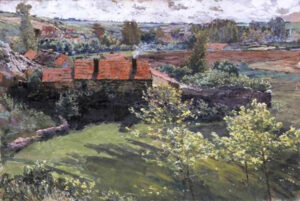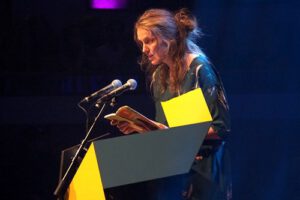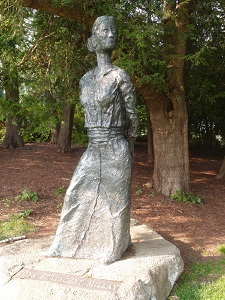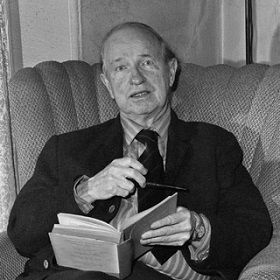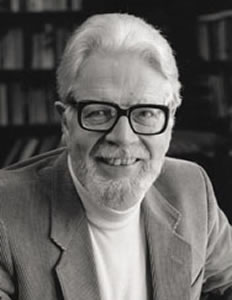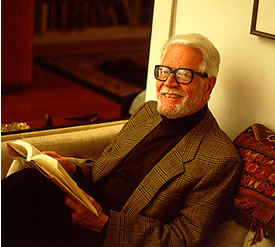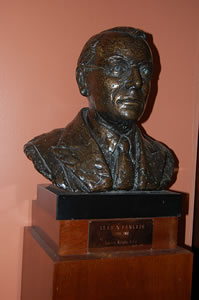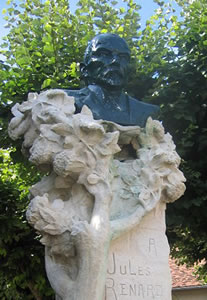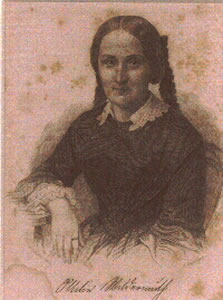De Nederlandse schrijver Arnon Grunberg werd geboren in Amsterdam op 22 februari 1971. Zie ook alle tags voor Arnon Grunberg op dit blog.
Uit: Onze Oom
„De aangebrande korsten van een stoofschotel? Rijst met restjes vlees? Hij was uit de slaapkamer gekomen om te kijken wat er aan de hand was, waar het geluid vandaan kwam, wat dat geluid te betekenen had, hoewel dat een overbodige vraag was – wat kon zo’n geluid betekenen? – en daarop had hij haar voor het eerst gevoeld. Hoewel ze enkele meters van hem vandaan stond, had hij het idee dat ze hem aanraakte. Nog voor hij haar had gezien, nog voor het licht van zijn zaklantaarn op haar gezicht was gevallen, meende hij dat ze hem betastte zoals een blinde dat doet.
Hij was zijn carrière begonnen als verkenner. Hij rook de ander voor hij hem zag. En hoewel die alertheid was verdwenen, ze had hem verlaten zoals een geliefde je verlaat, was ze er deze nacht weer. Sterker dan vroeger. Even had hij de zekerheid terug dat het leven niets anders was dan de concentratie waarmee je je omgeving observeerde.
Hij had haar beschenen met zijn zaklantaarn, hij had haar vlechten gezien, niet voor lang, maar lang genoeg om te besluiten dat hij meer licht nodig had. Ze had op dezelfde plek gestaan waar ze nu nog steeds stond.
Hij bleef haar aankijken terwijl zijn ondergeschikten elders zwijgend door het huis liepen en hij de zaklantaarn op de grond richtte om haar niet te verblinden. Een ogenblik had hij zich afgevraagd of ze wist wat er in de slaapkamer met haar ouders was gebeurd, maar toen had hij zich weer geconcentreerd op haar vlechten, de langste vlechten die hij ooit had gezien.“

Arnon Grunberg (Amsterdam, 22 februari 1971)
De Vlaamse dichter en schrijver Paul van Ostaijen werd geboren in Antwerpen op 22 februari 1896. Zie ook alle tags voor Paul van Ostaijen op dit blog.
Verlangen
Meenge mooie meid heeft door de domme, lange nacht,
naar het naakte bijzijn van de minnaar smartelik getracht,
zij heeft in de grote leegte van haar wit bed, de peluw gekust,
als wilde ze zijn matte hoofd in rust gesust.
Haar hoofd was ongerust te midden van de wilde haregeur,
haar armen grepen, bang begeren, om’t onzekere genot
dat zich niet bieden wou, als een wrang gebod
aan haar verlangen, door de nacht, – ’n weerstandloze deur. –
Haar vingren koesterden de naaktheid van het eigen lijf en rilden;
het eigen lijf dat onvoldaan bleef en vermoeid, onder het geheim
van deze koestering; de nacht, als één levende adem, trilde.
Haar adem ging opgelost in de nachtelike adem,
haar verlangen tot de eindelike slaap gesmacht.
Meenge mooie meid door de zware, zwoele nacht.
Else Lasker-Schüler
Dauwkorrels vingen mijn handen als ogen
en mij zoende de klare ziel.
Witte straten, massaal leger dat naar de rustplaats,
– o, Ik centrum van de wereld, – marsjeert.
Woorden zijn wegvallende gordijnen:
o ontwaken van de schone prinses en het zwemmen
van haar ogen in het onvatbare water.
Uw verzen zijn als sterren die de onmetelikheid van de hemel
beduiden.
Blauw: papier van de magiërster: mijn onschuld.
De wereld is boordevol goedheid,
doch een nieuwe drup doet de kelk niet overvloeien.
Dat is het stille, goede wonder. Het diepe wonder van de
werkelikheid.
Melopee
Voor Gaston Burssens
Onder de maan schuift de lange rivier
Over de lange rivier schuift moede de maan
Onder de maan op de lange rivier schuift de kano naar zee
Langs het hoogriet
langs de laagwei
schuift de kano naar zee
schuift met de schuivende maan de kano naar zee
Zo zijn ze gezellen naar zee de kano de maan en de man
Waarom schuiven de maan en de man getweeën gedwee naar de zee
Paul van Ostaijen (22 februari 1896 – 18 maart 1928)
De Duitse dichter en schrijver Hugo Ball werd geboren op 22 februari 1886 in Pirmasens. Zie ook alle tags voor Hugo Ball op dit blog.
Ein und kein Frühlingsgedicht
Ein Doppeldecker steigt aus jeder Flasche
Und stößt sich heulend seinen Kopf kaputt.
Der Übermensch verzehrt die Paprikagoulasche,
Zerbröselnd Semmeln, rülpsend in den Kälberschutt.
Den Gästen hängt der Kiefer bis zur Treppe,
Dort hinterlist’ge Fallen tätlich legend.
Aus dem Aburte schlitzt Lolô die Tangoschneppe,
Verpestend mit dem Lockendampf die Absinthgegend.
Denn siehe, ich bin bei euch alle Tage
Und meine schmettergelbe Lusttrompete packt euch an.
Der umgekippten Erektionen Frühlingsklage
Buhlt veilchenblau im Bidet mit dem Schwan(n).
Die Erfindung
Als ich zum ersten Male diesen Narren
Mein neues Totenwäglein vorgeführt,
War alle Welt im Leichenhaus gerührt
Von ihren Selbstportraits und anderen Schmarren.
Sie sagten mir: nun wohl, das sei ein Karren,
Jedoch die Räder seien nicht geschmiert,
Auch sei es innen nicht genug verziert
Und schließlich wollten sie mich selbst verscharren.
Sie haben von der Sache nichts begriffen,
Als daß es wurmig zugeht im Geliege
Und wenn ich mich vor Lachen jetzt noch biege,
So ist es, weil sie drum herum gestanden,
Die Pfeife rauchten und den Mut nicht fanden,
Hineinzusteigen in die schwarze Wiege.
Hugo Ball (22 februari 1886 – 14 september 1927)
De Servische schrijver Danilo Kiš werd geboren op 22 febrari 1935 in Subotica. Zie ook alle tags voor Danilo Kiš op dit blog.
Uit: A Tomb for Boris Davidovich (Vertaald door Duska Mikic-Mitchell)
„Miksha didn’t become a master craftsman. For two more years he sewed on buttons at Reb Mendel’s listening to his Talmudic reasonings, and then was forced to leave, sent off with a curse. One day in the spring of the notable year 1925, Reb Mendel complained that one of his Cochin hens had disappeared. “Reb Mendel,” said Miksha, “look for the thief among the Jews.” Reb Medel understood the force of the insult and for some time didn’t mention his Cochin hen. Miksha was also silent; he was waiting for Reb Mendel to conquer his pride. The old man struggled within himself, each day sacrificing a hen on the altar of this Talmudic haughtiness. With a stick in his hand, he kept vigil in the chicken coop until dawn, frightening away a skunk by barking like a dog. At dawn he fell asleep, and another hen disappeared from the chicken coop. “Let the great Righteous One smite me, He who said that all living creatures are equally worthy of His care and mercy,” said Reb Mendel on this ninth day. “Is it possible that one Cochin hen worth at least five chevronets is equal to a skunk who robs the poor and stinks far and wide?” “It isn’t, Reb Mendel,” said Miksha. “A Cochin hen worth at least five chevronets can’t be compared with a stinking skunk.” He said no more. He waited for the skunk to destroy what it could destroy, and to prove to Reb Mendel that his Talmudic prattle about the equality of all God’s creatures was worthless until justice was achieved on earth by earthly means. On the eleventh day Reb Mendel, exhausted by futile vigils, swollen and red-eyed, his hair full of feathers, stood in front of Miksha and began to beat his breast. “Herr Micksat, help me!” “All right, Reb Mendel,” said Miksha. “Brush off your caftan and take the feathers out of your hair. Leave this matter to me.”

Danilo Kiš (22 februari 1935 – 15 oktober 1989)
De Amerikaanse schrijfster Jane Bowles werd als Jane Auer geboren op 22 februari 1917 in New York. Zij bracht het grootste deel van haar jeugd door in Woodmere op Long Island. Op 15-jarige leeftijd kreeg zij tuberculose. Zij werd daarvoor in een sanatorium in Zwitserland behandeld, maar zou haar hele leven daar last van blijven houden. Na dit verblijf in Europa keerde zij in 1934 terug naar New York. Hier begon zij te experimenteren met biseksualiteit. Zij trouwde met de schrijver en componist Paul Bowles in 1938. Het echtpaar Bowles woonde in New York tot 1947. Daarna verhuisde Paul naar Tanger (Marokko) waar Jane een jaar later ook naartoe trok. Bowles wordt gezien als een writers’ writer en is onbekend bij het grote publiek. Tennessee Williams, Truman Capote en John Ashbery beschouwden haar als een van de beste en meest onderschatte Amerikaanse schrijfsters aller tijden. Als gevolg van overmatig drankgebruik, kreeg zij een beroerte in 1957, toen zij 40 was. Haar gezondheid ging daarna steeds verder achteruit. Jane Bowles stierf op 56-jarige leeftijd in een Spaanse kliniek.
Uit: Zwei sehr ernsthafte Damen (Vertaald door Adelheid Dormagen)
In Andys Wohnung war es zum Ersticken heiß. Die Möbel waren braun, und keines der Kissen passte richtig zu den Stühlen.
“So, Endstation”, sagte Andy. “Machen Sie’s sich bequem. Ich ziehe mir bloß was aus.” Einen Augenblick später kam er in einem Bademantel aus billigstem Material zurück. Die Enden des Gürtels waren teilweise abgekaut.
“Was ist denn mit Ihrem Gürtel passiert?”, fragte Miss Goering.
“Mein Hund hat das verbrochen.”
“Oh, Sie haben einen Hund?”, fragte sie.
“Früher htte ich mal einen Hund, eine Zukunft und ein Mädchen”, sagte er, “aber das hat sich alles geändert.”
(…)
“Sie halten nicht viel von Gesprächen, oder?”, sagte sie.
“Sie meinen ‘reden’?”
“Ja.”
“Nein, tu ich nicht.”
“Warum denn nicht?”
“Man sagt zuviel, wenn man redet”, antwortete er geistesabwesend.
“Aber interessiert es Sie denn nicht herauszufinden, wie die Menschen sind?”
Er schüttelte den Kopf. “Nein, hab keinen Bedarf, was über andere rauszufinden; und was viel wichtiger ist, die brauchen nichts über mich rauszufinden.”
Jane Bowles (22 februari 1917 – 4 mei 1973)
Jane en Paul Bowles
De Afro-Amerikaanse dichter, schrijver en essayist Ishmael Scott Reed werd geboren op 22 februari 1938 in Chattanooga, Tennessee, maar groeide op in Buffalo, New York, waar hij de University of Buffalo bezocht. Reed schreef o.a. The Free-Lance Pallbearers (1967, zijn eerste roman), Yellow Back Radio Broke-Down (1969), Mumbo Jumbo (1972), Flight to Canada (1976), The Last Days of Louisiana Red (1974), Reckless Eyeballing (1986), en Japanese By Spring (1993). Ook doceerde hij 35 jaar lang aan de University of California, Berkeley,
Jacket Notes
Being a colored poet
Is like going over
Niagara Falls in a
Barrel
An 8 year old can do what
You do unaided
The barrel maker doesn’t
The you can cut it
The gawkers on the bridge
Hope you fall on your
Face
The tourist bus full of
Paying customers broke-down
Just out of Buffalo
Some would rather dig
The postcards than
Catch your act
Amile from the drink
It begins to storm
But what really hurts is
You’re bigger than the
Barrel
Ishmael Reed (Chattanooga, 22 februari 1938)
De Canadese schrijver Morley Callaghan werd geboren op 22 februari 1903 in Toronto. Hij studeerde rechten, maar ging vervolgens als journalist voor de Toronto Daily Star werken, waarbij hij Ernest Hemingway leerde kennen. Net als Hemingway schreef Callaghan korte verhalen en trok hij naar Parijs. Tot zijn eerste werken behoren Strange Fugitive 1928, A Native Argosy 1929, A Broken Journey 1928 en Such is my Beloved 1934. Als zijn meesterwerk geldt de roman The Loved and the Lost uit 1951. Zie ook mijn blog van 22 februari 2007.
Uit: Such Is My Beloved
„Father Dowling took off his hat and looked around slowly as if it were most important that he find a proper place to put it. He saw the room with the faded blue flowers on the wall-paper, the thick blue curtains on the window, the wide iron bed, painted white but chipped badly at the posts, and the copper-colored carpet that had a spot worn thin near the side of the bed. There were two chairs in the room. A door led into the next room. While he was looking around, the tall fair girl, who was wearing a loose blue dress that concealed the angularity of her body, assumed a ready smile, came over beside him and began to help him off with his coat with a dreadful efficiency. And the little, dark one with the round brown eyes and the smooth soft skin and a big bunch of black hair at the nape of her neck, jumped up from her chair with the same impressive efficiency, and in the affected manner of a great lady, extended her left hand with the elbow crooked as if he would be permitted just to touch the tips of her fingers. “How do you do, Sweetie. We are so mighty pleased to see you. You can’t go wrong in coming here to see me.”
“Who said he was coming to you?”
“He’ll want to come to me. Won’t you want to come to me?”
“Take it easy, Midge. Don’t be so pushing. He doesn’t want you. Why, he first spoke to me. You heard him speak to me. Hell, though, if Rosy Cheeks wants you, it’s all the same to me.”
“I’m not trying to rush him. Let him suit himself.”

Morley Callaghan (22 februari 1903 – 25 augustus 1990)
De Ierse schrijver Sean O’Faolain werd geboren op 22 februari 1900 in Cork. Zie ook mijn blog van 22 februari 2007.
The Heavenly Banquet
Ascribed to St Brigid
I would like to have the men of Heaven
in my own house;
with vats of good cheer
laid out for them.
I would like to have the three Marys,
their fame is so great.
I would like people
from every corner of Heaven.
I would like them to be cheerful
in their drinking.
I would like to have Jesus, too,
here amongst them.
I would like a great lake of beer
for the King of Kings.
I would like to be watching Heaven’s family
drinking it through all eternity.
Vertaald door Sean O’Faolain
Sean O’Faolain (22 februari 1900 – 20 april 1991)
De Franse schrijver Jules Renard werd geboren op 22 februari 1864 in Châlons-du-Maine. Zie ook mijn blog van 22 februari 2007.
Uit: La Galette
„C’est une espèce de galette qu’on appelle brûlée. C’est une galette plate et sèche que ma cousine Nanette fait, le jour qu’elle cuit, avec ce qu’elle gratte de pâte collée au fond de l’arche, quand elle a préparé tous ses pains de ménage. Et il faut encore, pour qu’elle se décide à faire sa galette, qu’il lui reste un morceau de beurre de la semaine. Mais j’aurais tort de m’imaginer que cette brûlée est pour moi. Nanette ne se préoccupe de personne. Elle utilise seulement les miettes de son arche.
Si je lui dis que j’aime la brûlée et que je ne connais rien de meilleur qu’un bout de brûlée chaude avec un verre de vin blanc, elle me répond :
— Moque-toi des pauvres gens comme nous. Va, mange tes gâteaux ; tu n’auras pas de notre galette de malheureux.
Voilà comme elle me répond, et le lendemain matin, de bonne heure, elle arrive portant sa brûlée dans une serviette. Elle le pose sur ma table et dit :
— Je t’apporte tout de même un quartier de brûlée. Si tu la veux, tu la prendras. Si tu ne la veux pas, tu la laisseras.
Je ne dis ni oui ni non.
— Je parie, dit-elle, que tu vas la donner à ton chien.
Je ne lève même pas les épaules.
— Et peut-être, dit-elle, que c’est trop grossier pour la fine gueule de ton chien, et qu’aussitôt que je serai partie, tu jetteras ma brûlée dans tes ordures.
J’ai l’air de ne plus entendre.“
Jules Renard (22 februari 1864 – 22 mei 1910)
De Amerikaanse dichter, essayist, uitgever en diplomaat James Russell Lowell werd geboren op 22 februari 1819 in Cambridge, Massachusetts. Zie ook mijn blog van 22 februari 2007.
May is a pious fraud
May is a pious fraud of the almanac.
A ghastly parody of real Spring
Shaped out of snow and breathed with eastern wind;
Or if, o’er-confident, she trust the date,
And, with her handful of anemones,
Herself as shivery, steal into the sun,
The season need but turn his hour-glass round,
And Winter suddenly, like crazy Lear,
Reels back, and brings the dead May in his arms,
Her budding breasts and wan dislustred front
With frosty streaks and drifts of his white beard
All overblown. Then, warmly walled with books,
While my wood-fire supplies the sun’s defect,
Whispering old forest-sagas in its dreams,
I take my May down from the happy shelf
Where perch the world’s rare song-birds in a row,
Waiting my choice to upen with full breast,
And beg an alms of springtime, ne’er denied
Indoors by vernal Chaucer, whose fresh woods
Throb thick with merle and mavis all the years.
James Russell Lowell (22 februari 1819 – 12 augustus 1891)
De Amerikaanse dichteres en schrijfster Edna St. Vincent Millay werd geboren op 22 februari 1892 in Rockland, Maine. Toen zij acht jaar was scheidden haar ouders en Edna ging met haar moeder en zusters in Camden, Maine, wonen. In 1917, na haar opleiding, vestigde zij zich in New York en begon zij te schrijven om in haar onderhoud te voorzien. Haar eerste bundel Renascence and Other Poems verscheen. Onder het pseudoniem Nancy Boyd schreef zij ook korte verhalen. In 1923 trouwde zij met de tijke Nederlander Eugen Jan Boissevain. Ook kreeg zij dat jaar voor haar bundel The Harp Weaver and Other Poems de Pulitzer Prize
Ashes Of Life
Love has gone and left me and the days are all alike;
Eat I must, and sleep I will,—and would that night were here!
But ah!—to lie awake and hear the slow hours strike!
Would that it were day again!—with twilight near!
Love has gone and left me and I don’t know what to do;
This or that or what you will is all the same to me;
But all the things that I begin I leave before I’m through,—
There’s little use in anything as far as I can see.
Love has gone and left me,—and the neighbors knock and borrow,
And life goes on forever like the gnawing of a mouse,—
And to-morrow and to-morrow and to-morrow and to-morrow
There’s this little street and this little house.
City Trees
The trees along this city street,
Save for the traffic and the trains,
Would make a sound as thin and sweet
As trees in country lanes.
And people standing in their shade
Out of a shower, undoubtedly
Would hear such music as is made
Upon a country tree.
Oh, little leaves that are so dumb
Against the shrieking city air,
I watch you when the wind has come,—
I know what sound is there.
Edna St. Vincent Millay (22 februari 1892 – 19 oktober 1950)
De Duitse schrijfster Ottilie Wildermuth werd geboren op 22 februari 1817 in Rottenburg am Neckar. In 1847 stuurde zij voor het eerste een verhaal (Eine alte Jungfer) op voor publicatie in het Morgenblatt. Toen het was aangenomen ging zij door met het schrijven van verhalen, novellen, familie-en jeugdverhalen. Zij werd een van de bekendste schrijfsters van haar tijd. In 1871 kreeg zij de grote gouden medaille voor kunst en wetenschap.
Uit: Eine alte Jungfer
“In der Vorstadt des Städtchens, wo ich meine Jugend verlebt, stand ein gar freundliches Häuschen, das aus seinen vier Fenstern recht hell in die Welt hinausschaute; daneben ein Garten, nicht eben kunstvoll angelegt noch zierlich gepflegt, sondern zum Teil mit Küchengewächsen, zum größeren aber mit lustigem Gras und mit Obstbäumen bestanden. Dicht neben dem Häuschen breitete ein stattlicher Nußbaum seine dunkelgrünen Zweige aus und warf seinen Schatten und zur Herbstzeit seine Früchte gastlich weit in die Straße hinein, ein geschätzter Sammelplatz für die liebe Jugend der ganzen Vorstadt. Minder freundlich und einladend erschien ein Paar kleiner fetter Möpse, die sich abwechselnd oder gemeinsam auf der Gartenmauer sehen ließen und die obbemeldete Jugend und die Vorübergehenden beharrlich anbellten, ohne jedoch die mindeste Furcht zu erregen, da ihre beschwerliche Leibesbeschaffenheit ihnen nicht gestattet hätte, ihre Drohungen auszuführen.
Wer nun erwartet, an den Fenstern des Häuschens einen lockigen Mädchenkopf zu erblicken, wie das in ländlichen Novellen der Fall zu sein pflegt, der täuscht sich. Nein, so oft die Hausglocke gezogen wurde, und das geschah sehr oft, erschien am Fenster das allzeit freundliche, aber sehr runzelvolle Angesicht der Jungfer Mine, der unumschränkten Herrin und Besitzerin des Häuschens. Und doch wurde dieses gealterte Antlitz von jung und alt so gern gesehen wie nur je eine blühende Mädchenrose, und ihre Beliebtheit stieg noch von Jahr zu Jahr, was bei jungen Schönheiten gar selten der Fall ist.“
Ottilie Wildermuth (22 februari 1817 – 12 juli 1877)
Portret door Sophie Pilgrem, rond 1835
